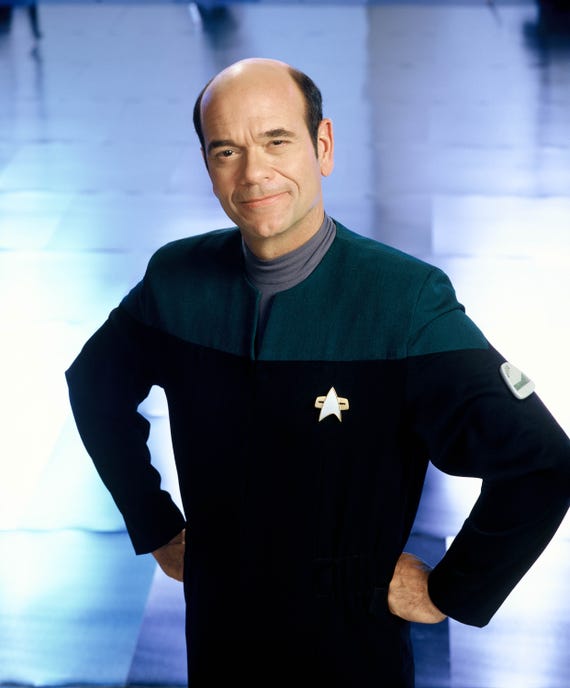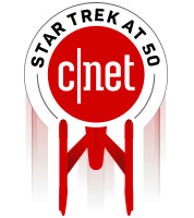As part of CNET’s coverage of Star Trek’s 50th anniversary, we talked with a dozen cast members from across the franchise about everything from Star Trek’s inclusive message to whether Siri can replace the ship’s computer.
By Ian Sherr
Robert Picardo thought he’d just landed the most boring role in the Star Trek universe.
He’d been asked to play the “Emergency Medical Hologram,” an interactive computer doctor on “Star Trek: Voyager,” a show about the seven-year journey home for a starship flung across the galaxy by an alien being. Picardo’s character, called “The Doctor,” had nine lines in the pilot episode that ran in 1995, and none of them seemed interesting to him.
“I thought he was humorless,” Picardo said. Instead, he wanted to play Neelix, a new alien who enthusiastically joins the Voyager crew as a guide and cook. The actor was, however, a bit worried about the makeup. Producers wouldn’t tell him if it involved a prosthetic head, something pretty much every actor despises because the makeup process is long and the get-ups are usually uncomfortable to wear.

Robert Picardo as The Doctor (who names himself “Joe” in the last episode. Yes, we waited seven years for “Joe.”) / CBS
He didn’t get the part, but the producers contacted him again to play The Doctor. They told him to be funny, but he still thought the dialogue seemed too serious. “I bluffed my way through the audition,” he said.
When he got to the part where The Doctor is left alone in the ship’s sick bay, he looked around and said the line, “I believe someone has failed to terminate my program.”
Then he ad-libbed: “I’m a doctor, not a nightlight.”
That channeling of Dr. Leonard McCoy’s famous catchphrase from the original Star Trek series (“I”m a doctor, not an escalator!“) landed him the part and helped him change The Doctor into one of the most beloved characters on “Voyager.”
Pretty soon, Picardo realized the ongoing gag about The Doctor was that he had an awful bedside manner — and a superiority complex. He was programmed to embody nearly all the show’s medical knowledge, but he was stuck treating the crew’s scrapes and bruises.
At one point, Picardo recommended to the writers that his character become an opera fan. The idea of seeing his emotionless face on the screen while gut-wrenching arias about love and loss play behind him seemed hilarious.
Turned out he was right.
Picardo, now 62, graduated from Yale University with a drama degree after starting as a pre-med major.
He seems to have a penchant for playing neurotics and doctors. You may remember him from “The Wonder Years” as Coach Cutlip, a PE teacher whom Picardo imagined as wanting to teach English but who gets shafted with something else. “I played a character who had the IQ of a stupid walrus,” he said. The role earned him an Emmy nod.
In “China Beach,” he played a doctor drafted into the Vietnam War who starts the show being kicked in the groin by a woman disgusted by his sexist attitude.
After “Star Trek: Voyager,” which ran from 1995 to 2001, Picardo got involved in another popular sci-fi project. This time, it was the “Stargate” franchise of TV shows about a modern secret military program using ancient alien technology to travel to the stars. He was supposed to play a bureaucrat whose inquiry justified a clip show. But his “douchebag” version of The Doctor’s bedside manner went over so well the producers invited him to join the cast.
The Doctor changed Picardo’s life in other ways. He was asked to join The Planetary Society, co-founded by famous astrophysicist Carl Sagan. The nonprofit acts as an advocacy group for space science and exploration, and it has led Picardo to work with celebrated figures like Bill Nye and Neil deGrasse Tyson.
At first, Picardo said it seemed a little weird being revered while sitting on stage next to actual astronauts. “Now I not only made peace with it, I went ‘Gosh, if I’m gonna get this opportunity, then I’m gonna celebrate it and embrace it and see what I can do in my own small way, to help bring the science fiction fan to real science,'” he said.
Asked what type of Star Trek tech he wished he had, Picardo didn’t say “the transporter” like nearly everyone else interviewed for this series. Instead, he talked at length about the $10 million Qualcomm XPrize to invent a noninvasive medical scanner — the real-life equivalent of the medical tricorder from Star Trek that could instantly detect any illness or injury.

